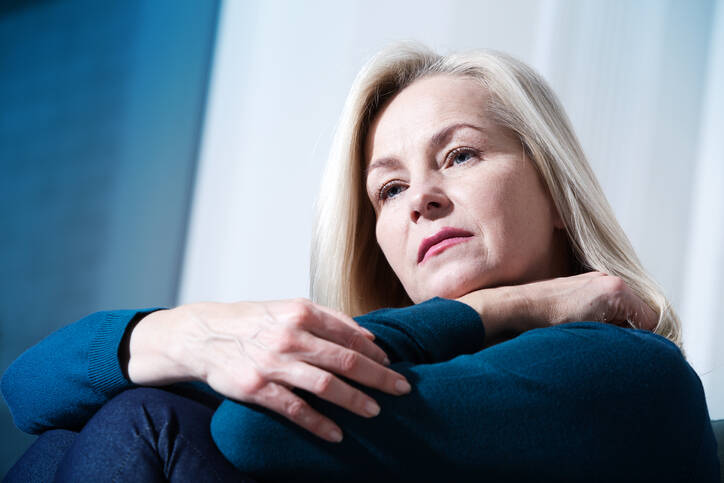A woman in transition? What are the signs of the approaching menopause?

Terms such as menopause, menopause or transition rightly cause women concern. The manifestations of this period significantly affect life and normal functioning. How to cope with this unpleasant period?
Article content
What is menopause and how does menopause work?
Climacterium, also known as transition, is the name given to the period between a woman's childbearing age and the cessation of ovarian function.
It refers to the time when the ability to conceive is gradually lost, the menstrual cycle becomes irregular until it eventually disappears altogether.
Menopause is the last menstrual bleeding in a woman's life. It is a natural phenomenon when the function of the ovaries is completely extinguished.
In the table below, we clarify some of the terms
| Premenopause | the period before menopause | menstruation is still present, but estrogen levels gradually decrease |
| Menopause | last menstrual period | loss of ovarian function |
| Perimenopause | the period around menopause | precedes menopause and the period one year after menopause |
| Postmenopause | the period after menopause | approximately 12 months after the last menstrual period |
We can talk about menopause if there is no bleeding, even a little, for at least 12 months after the last menstrual bleeding. This is followed by postmenopause.
Read our interesting article.
What are the symptoms of andropause - the first symptoms
Climacterium is a period that occurs in every woman at different ages. It depends mainly on genetic factors, racial factors, but also lifestyle and habits. It usually appears sometime between 45 and 55 years of age.
Earlier onset of menopause can occur in women who are overweight, in smokers, but also in women who started menstruating at a later age.
During this period, a woman may experience various difficulties. The body undergoes certain changes that manifest themselves in the body through various symptoms. The totality of these symptoms is also called menopausal syndrome.
A woman may experience similar difficulties as in pregnancy. In this case, too, there are sharp hormonal fluctuations that cause them.
The most common symptoms of menopause:
- hot flashes
- sweating
- night sweats
- insomnia
- heart palpitations
- light-headedness
- irritability
- depression
- impaired memory and concentration
- loss of libido
- headaches
Menstrual cycles gradually become irregular. Bleeding becomes weaker and shorter. Individual cycles become longer and longer until they eventually disappear altogether.
You can read more about these and the menstrual cycle in the article Why is my period late?
The hormone estrogen and menstruation
During the menopause, there is a gradual deficiency of a hormone called estrogen. It is primarily a female sex hormone, although it is also found to a small extent in men.
It is produced mainly by the ovaries. It takes care of a number of processes in a woman's body. It affects, for example, ovulation, fertility, pregnancy, childbirth and lactation.
In menopause, the level of estrogen decreases, which causes a gradual extinction of ovarian function and loss of the menstrual cycle.
Among other things, a lack of this hormone is responsible for a greater susceptibility to diseases of the cardiovascular system or thinning of the bones.
This decline also accelerates the ageing of the skin. It is responsible for the loss of water in the skin, which is manifested by wrinkles and loss of elasticity.
Climacterium and intimate life
It is natural for a woman to lose interest in sex during this period. Reduced production of estrogen causes a decrease in libido, moisture in the vagina and problems with the urinary system.
Urinary tract infections and incontinence may also occur more frequently.
Effects of menopause on the cardiovascular system
During this period of dramatic hormonal changes, there is also a period of increased incidence of cardiovascular, or heart disease.
In the menopausal period, the following are more common:
Studies have not shown a positive benefit of replacement therapy for these diseases. Although estrogen replacement has suppressed the unpleasant symptoms of menopause, the results have not met the expectations for the development of cardiovascular disease. Therefore, prevention and treatment of these diseases rely mainly on lifestyle changes and avoidance of other risk factors.
Prevention of cardiovascular disease includes:
- weight adjustment
- appropriate diet
- regular exercise
- no smoking
- avoiding stress
In addition to these measures, emphasis is placed on the correction and treatment of high blood pressure, diabetes and elevated blood fat levels.
If you are interested in this topic, read our articles on cardiovascular disease.
Climacterium and osteoporosis
Osteoporosis is a metabolic disease of the bones in which thinning occurs. Lack of estrogen causes an increased incidence of this disease.
Calcium deficiency, thinning of the bone mass and decrease in its resistance means increased susceptibility to fractures and other bone injuries.
During perimenopause, there is a loss of 3-10% of bone density in the spine. In the postmenopausal period, there is a further loss of 6-14%.
Prevention consists mainly in maintaining a proper lifestyle. A diet with sufficient calcium and vitamin D is important.
In the past, osteoporosis in menopause was considered a natural part of ageing. Today, it is no longer classified as a disease. Estrogen replacement is considered an effective way of preventing and treating osteoporosis. Treatment is determined by the doctor according to specific and individual criteria.
How to relieve menopausal problems
The unpleasant symptoms that occur during menopause are mainly caused by certain triggers. These include hot drinks, spicy food or alcohol. If you suffer from hot flashes, it is a good idea to avoid these factors. Similarly, avoid stress and obesity.
Excessive subcutaneous fat acts as an insulator. You may also be interested in this article. BMI: How to calculate body mass index? Calculator + formula
Sweating and hot flashes can be better managed if you avoid tight and leaky clothing. Rather, prefer multiple layers that you can gradually shed if necessary.
Choose a material that allows your skin to breathe and wicks sweat, such as thermal underwear.
Mood swings and irritability can be more easily controlled with adequate sleep. Relaxation, avoiding stress, and breathing exercises are all beneficial in managing them.
Diet in menopause
During the menopause, follow a drinking regime. Avoid alcohol and cigarettes. Make sure you eat a varied and balanced diet, rich in calcium and vitamin D. Also include plenty of fibre in your diet.
In particular, eat whole grains and low-fat proteins. Some studies have shown the positive effects of soya.
Read also the articles:
Avoid simple sugars, white flour and saturated fats. Plan your dinner at least three hours before bedtime.
A healthy diet will improve digestion and avoid unnecessary bloating.
Regular physical activity
Adequate exercise and regular exercise not only improves your general well-being. It also increases the body's resistance, boosts immunity and aids digestion. It also improves mood and helps in relieving stress and depression.
You may also be interested in this article.
Medication in menopause?
During the menopause, various changes occur in women's lives. They can vary from woman to woman and each woman copes with them differently.
In case of difficulties, do not hesitate to contact your gynaecologist. You can consult him about prevention and measures against menopause syndrome. He can also suggest so-called hormone replacement therapy.
During menopause, hormones such as estrogen decrease. This results in a number of changes and accompanying problems.
Estrogen replacement can prevent the difficulties and complications that accompany menopause. However, this is a matter for individual assessment and decision by the gynaecologist.
There are specific criteria for hormone replacement therapy. As with any treatment, there are certain risks.
Possible risks of hormone therapy:
- Increased risk of blood clots
- risk of myocardial infarction and stroke
- memory impairment
- risk of Alzheimer's disease
Taking hormones is recommended at the lowest possible dose and for the shortest possible time.
How to manage menopause?
In this period, several unpleasantnesses await a woman, which cannot always be avoided. Women have to cope not only with them, but also with the fact that they will no longer be fertile. Many women feel a loss of femininity.
It is a period that is increasingly associated with health problems. Women are worried about ageing faster, gaining weight and a general loss of vital energy.
In addition to the physical manifestations, there are also psychological problems. Not only the effects of hormones but also the transition to the next stage of life make women feel insecure, frustrated and inferior.
Women who are more concerned about their family life and children, their hobbies, their needs and their hobbies are better managed. Women who are overly family-oriented tend to lose their roles as mothers and housewives during this period. They are therefore more prone to feelings of emptiness, inferiority and depression.
It is important to realise that life does not end with menopause and loss of fertility. It is important to continue to maintain a healthy lifestyle and mental well-being. To pursue hobbies and interests or to try something completely new.
After all, it's finally time for a woman to have time for herself again.
Interesting resources










